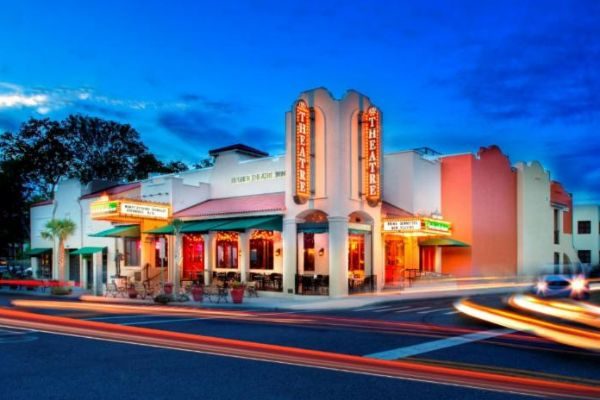
Feature
Stages of Success: Fifty Years of Florida Studio Theatre
By Scott Ferguson | March 2024
This season, Florida Studio Theatre is celebrating half a century as one of Sarasota’s most successful arts organizations. On its five stages, audiences can experience cutting-edge contemporary drama, crowd-pleasing cabaret musicals and inventive improvisational comedy.
From its humble beginnings in 1973 as a nomadic company touring community centers, nursing homes, migrant camps and prisons, to a bustling theater district in itself in downtown Sarasota, FST now has a subscription base of over 40,000 — one of the largest among American regional theater companies. Serving over 230,000 audience members a year, Florida Studio Theatre has a proud past and an even more exciting future.
Richard Hopkins, FST’s producing artistic director and CEO, tells the company’s origin story: “I worked with Jon Spelman, Florida Studio Theatre’s founder, at the Asolo Theatre in Sarasota in the early 1970s. He was the director of education and I was an actor. I left the Asolo and went to Washington, D.C. to start the Palisades Theatre Company there, and Jon started Florida Studio Theatre here in Sarasota.
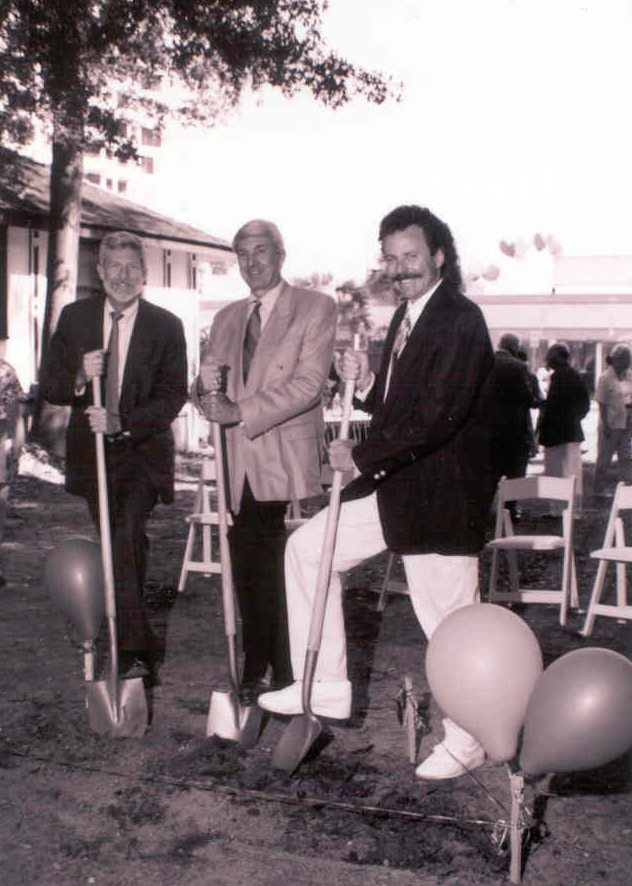
“When my theater company grew, we moved it from Washington down to St. Petersburg. I had stayed in touch with Jon, directed two or three shows for him over those years and wrote a play that he produced. I left the theater company in St. Pete (now known as American Stage) in 1980. Jon asked me if I would run FST while he went on a year-long sabbatical. I said yes.” After a beat he deadpans, “I’m still waiting for him to come back.”
Before Hopkins stepped in, FST was using the 1915 Sarasota Woman’s Club building as a rehearsal space. He loved the Tudor Revival-style building and convinced generous donors to contribute to a campaign to help FST buy it and renovate it as a theater and offices, establishing a permanent home and resident company. In 1985, FST completed its purchase of the historic building and renamed it the Keating Theatre in 2003 in honor of donors Ed and Elaine Keating.
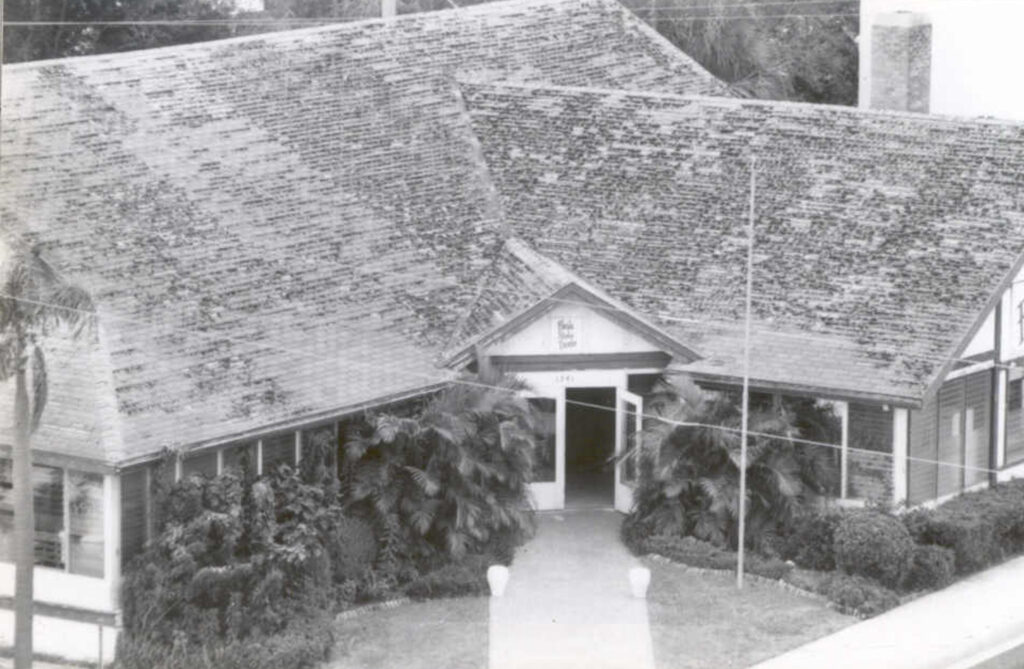
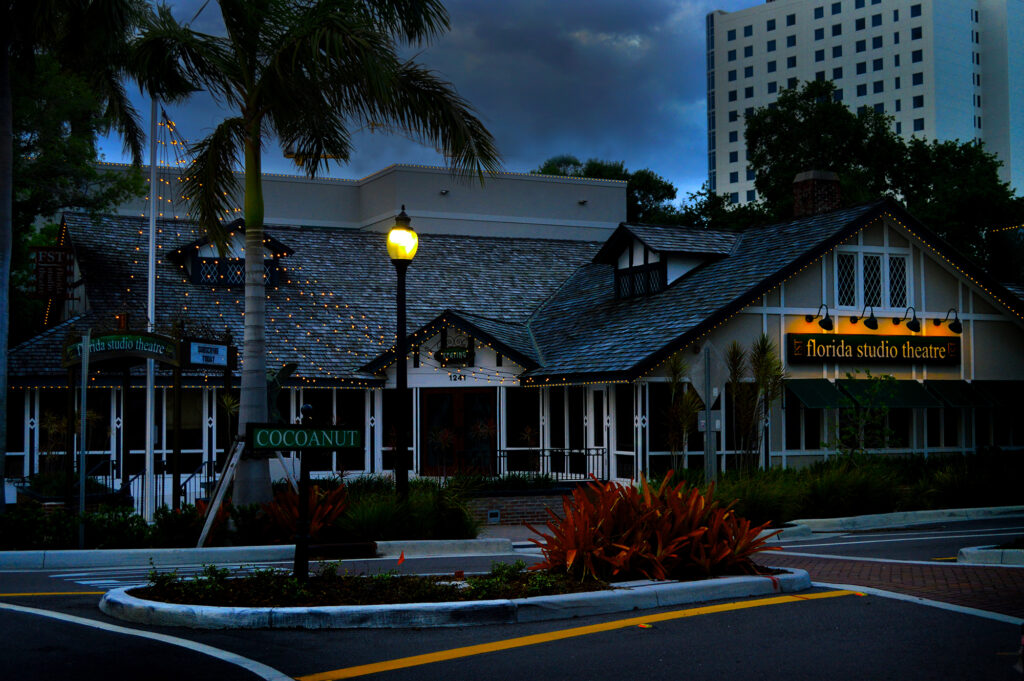
Rebecca Langford joined FST in 1998. After a two-week stint in the box office she was named marketing director, and became managing director in 2003. Rebecca and Richard were married in 2011.
As a formidable team, Richard and Rebecca, with support from FST’s board of trustees, its donors and patrons, have spearheaded a lot of changes.
“Throughout our growth over the years, we’ve made very conscious choices,” notes Rebecca. “We tackled one project at a time, growing out of our needs and the needs of our audience. For example, we started in the Keating Theatre, which was about 80 seats to start with, but now it’s 173 — still a small, intimate theater. We made the length of show runs longer and longer as more audience members came. And when we had the choice to build a cabaret, we built an intimate one with 100 seats (the Goldstein Cabaret Theatre).”
As more people flocked to the mainstage productions and the cabaret shows, more choices were made to meet the growing audience demand.
“That’s what drew us across the street to where the Gompertz Theatre and the John C. Court Theatre are now,” says Rebecca. “Our calendar was full, yet more people wanted to come. But at the end of the day, we didn’t want to lose the intimacy. So instead of building bigger we built more, which is kind of revolutionary. But I think it’s part of our strength and what has made us so unique—it has allowed us to do more diverse work by having more theaters that did different things.”
Richard elaborates on the turning point in the growth of FST. “When we started studying what is now the Gompertz Theatre footprint,” he recalls, “the consultants suggested that we build a 300- to 500-seat theater for our future growth. We looked at other theater companies in America at that time, especially the ones that had built new theaters in the last decade. We found that many of them had built stages that were too big, and they had to put a lot of big sets on those large stages, so it cost a lot more money to produce their shows. Their theaters were too big and they often couldn’t fill them.
“We literally had a design for a 300-seat theater, but we heard stories of the people who were sorry about what they built. And that took us back to repurposing and renovating the existing Gompertz Theatre and building another cabaret theater, and then building a little 100-seat experimental theater, Bowne’s Lab, which became our improv theater.”
In addition to presenting a wide variety of professional productions on its five stages, introducing young people to the world of theater has long been a part of FST’s mission. In 1982, the company launched its education programs for school-age children. Today, these programs —including Write a Play, which helps students earn their own wings as playwrights—have served thousands of children throughout Florida and in other states. Through international exchange programs, FST has also brought the Write a Play program to cities in Israel, Scotland and Russia. In 1983, FST initiated its New Play Festival. Thousands of children and adults have submitted plays for consideration.
On the drawing board now is the company’s most ambitious project to date—the Mulva Arts Plaza, a state-of-the-art, eight-story building. The plaza will include an additional mainstage theater and two more cabaret theaters to allow for more programming, as well as housing for FST guest artists and for Sarasota’s year-round arts workers, and more patron parking. The completion is a few years away.
“It’s our biggest undertaking ever, a $56 million project,” says Richard. “Our expectation is that we’ll break ground in the third or fourth quarter of 2024, no later than December. “It’s an 18-month buildout for Phase One, which will be parking and housing for our actors. Some of the apartments will be for people who work in the arts and who live here year-round. We will rent those at a cost below market value, because affordable housing is hard to find and artists are usually near the bottom income level. Phase Two will be the new cabaret theaters. Phase Three will be the new mainstage theater.”
How has FST managed to be such a success story for five decades?
“I think it’s important to mention that Dennis McGillicuddy, the president of our board of trustees, has been a huge part of the history of FST,” Rebecca says. “When we talk about the people who have made a difference, he’s certainly one of them. He has led the board to be strategic and to think long-range. Our board is tremendous because they don’t get into the weeds and say we can’t do something. They ask how we can.”
What are the Hopkins’ hopes for the future of Florida Studio Theatre?
“We’ve always been very connected to the audience and committed to our role as a public theater for everybody,” says Rebecca. “And I hope that whatever happens in the future, those core values remain.”
“My hope,” Richard adds, “is that we will continue to evolve in tune and in step with the people we are here to serve. My view is that intimate theater is going to become even more important in the future, because the more time we spend on computers and in high tech, the greater the need for soft touch, face-to-face interaction and the social encounters we have in the theater. There’s nothing better than a high-quality performance in an intimate space with excellent artists. You just can’t beat it.”
Something for Everyone!
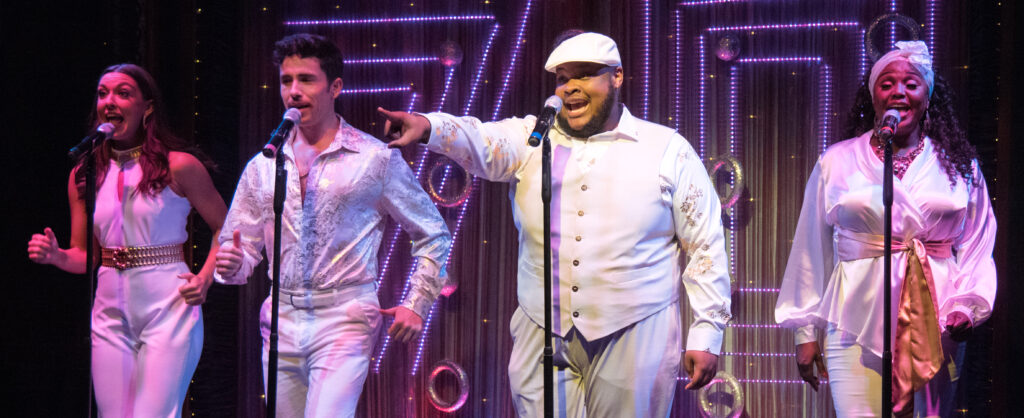
Comedy tonight? Cutting-edge drama? How about a musical revue? Florida Studio Theatre has you covered. Here’s what’s playing now, plus a few coming attractions:
FST Improv: Life’s a Beach, an improvisational, satirical look at life in Sarasota (through March 23)
Up on the Roof (limited return engagement), a salute to the 1950s and 60s hits by composers Carole King and Gerry Goffin, Jerry Leiber and Mike Stoller and others (March 8-24)
The Lehman Trilogy, Stefano Massini’s saga of the rise and fall of the Lehman Brothers financial empire, adapted by Ben Power, directed by Richard Hopkins (through March 29)
Take it to the Limit, a cabaret show by Richard and Rebecca Hopkins and Sarah Durham — tribute to 1970s rock and roll rebels including the Allman Brothers, the Eagles and Linda Ronstadt (through April 21)
The Flip Side, by Rebecca and Richard Hopkins, showc
asing comedy songs like “I’m My Own Grandpa,” “The Ballad of Sigmund Freud,” and “Killed by a Coconut” (through June 16)
FST Improv: March 30 (one night only): Tournament of Fools, billed as “a knock-down, drag-out comedy battle royale”
April 3-May 19: Troubadour, the story of an aspiring musician in 1951 Nashville, with story by Janice Shaffer and music by Sugarland’s Kristian Bush
FST Improv: April 6-May 25: Comedy Roulette, described as “the most unpredictable improv show of the year!”
Tickets and more information are at FloridaStudioTheatre.org or 941-366-9000.



You must be logged in to post a comment Login